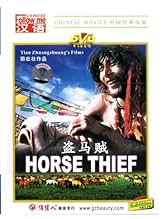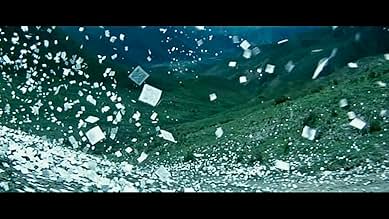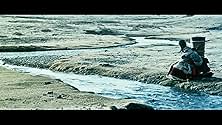IMDb-BEWERTUNG
6,8/10
1653
IHRE BEWERTUNG
Füge eine Handlung in deiner Sprache hinzuA Tibetan man struggles to provide for his family.A Tibetan man struggles to provide for his family.A Tibetan man struggles to provide for his family.
- Auszeichnungen
- 1 wins total
Empfohlene Bewertungen
A fascinating window into the world of Tibetan tribal life. Beautifully shot with stunning locations. The narrative is a little weak, but makes up for it visually.
One draw back is a few scenes of animal cruelty. These images are what stayed with me most and unfortunately let down the movie.
I cannot help thinking that Tian Zhuangzhuang is not only the least appreciated of the great contemporary Chinese directors, but also the least talented - his films (that is, the three that I have seen) made a lesser impression on me than, let's say, the works of Jia Zhangke or the nineties' output of Zhang Yimou.
"Lan feng zheng" (The Blue Kite), a socio-critical portrait of life in Communist China, seems a bit too static in its quiet, sober realism, with the director's continuous effort to charge Maoism tending to veil everything else ; only in the last segment the movie became truly touching for me.
In "Xiao cheng zhi chun" (Springtime in a Small Town) a couple of characters are, zombie-like, dragging past ornamental decorations of dilapidating claustrophobic interiors, or alternately walking on ruins of an ancient city wall ; I found this hardly anything more than a rather boring, banal quasi-Chekhovian étude.
The last - in fact, the oldest - of the three, "Dao ma zei" (The Horse Thief), is quite different. Minimalistic in plot and dialogues, it might be described as a sort of ethnographic documentary with touches of folk ballad : lyrical cinema close to some works of the Armenian Parajanov, albeit, to my regret, lacking his emotional power. Tibetan nature is the vamp of the movie, local religion + magic its core. The former I do savour, the latter I struggle to grasp, owing to the fact that my knowledge of it is considerably limited.
The last reason why I don't praise "The Horse Thief" as Scorsese did, may lie in the quality of the Chinese region-free disc (gzbeauty). Nevertheless, the non-anamorphic image from an old print, dirty and scratched, is better than I expected. It can be zoomed to proper OAR 2,35:1 on my player, though there's no room for subtitles then. For second viewing, they are not necessary anyway.
For those who liked "The Horse Thief" but felt deprived of the epic/action element, I would recommend "Kekexili" (Mountain Patrol) by Tian's compatriot Lu Chuan.
"Lan feng zheng" (The Blue Kite), a socio-critical portrait of life in Communist China, seems a bit too static in its quiet, sober realism, with the director's continuous effort to charge Maoism tending to veil everything else ; only in the last segment the movie became truly touching for me.
In "Xiao cheng zhi chun" (Springtime in a Small Town) a couple of characters are, zombie-like, dragging past ornamental decorations of dilapidating claustrophobic interiors, or alternately walking on ruins of an ancient city wall ; I found this hardly anything more than a rather boring, banal quasi-Chekhovian étude.
The last - in fact, the oldest - of the three, "Dao ma zei" (The Horse Thief), is quite different. Minimalistic in plot and dialogues, it might be described as a sort of ethnographic documentary with touches of folk ballad : lyrical cinema close to some works of the Armenian Parajanov, albeit, to my regret, lacking his emotional power. Tibetan nature is the vamp of the movie, local religion + magic its core. The former I do savour, the latter I struggle to grasp, owing to the fact that my knowledge of it is considerably limited.
The last reason why I don't praise "The Horse Thief" as Scorsese did, may lie in the quality of the Chinese region-free disc (gzbeauty). Nevertheless, the non-anamorphic image from an old print, dirty and scratched, is better than I expected. It can be zoomed to proper OAR 2,35:1 on my player, though there's no room for subtitles then. For second viewing, they are not necessary anyway.
For those who liked "The Horse Thief" but felt deprived of the epic/action element, I would recommend "Kekexili" (Mountain Patrol) by Tian's compatriot Lu Chuan.
Big screen is the only place to see this masterpiece. As the last of the films viewed @ the Detroit Institute of Arts Detroit Film Theatre's Monday Night Series, Horse Thief was fitting to be viewed last: truly the best was saved till last.
A Detroit Free Press reviewer gave the film only 2 stars because of a "sorely needed script". The beauty of this film is exactly that lack of dialogue which leaves room to enjoy the visual feast that the director intended.
I am grateful that the film was allowed out of China at all and privileged to view the beauty of Tibetan culture and Buddhist monk rituals, the inside of a Tibetan temple with rows and rows of flickering candles, the tortured beauty of the mountainous region in summer, spring and winter and the painful, poignant and ultimately tragic tale of a man, his wife and children and their lives in a region of the world that some Americans might only see in the pages of National Geographic.
A Detroit Free Press reviewer gave the film only 2 stars because of a "sorely needed script". The beauty of this film is exactly that lack of dialogue which leaves room to enjoy the visual feast that the director intended.
I am grateful that the film was allowed out of China at all and privileged to view the beauty of Tibetan culture and Buddhist monk rituals, the inside of a Tibetan temple with rows and rows of flickering candles, the tortured beauty of the mountainous region in summer, spring and winter and the painful, poignant and ultimately tragic tale of a man, his wife and children and their lives in a region of the world that some Americans might only see in the pages of National Geographic.
After hearing Martin Scorsese declare Horse Thief as the #1 film of the 90s (actually released in 1987) when co-hosting the annual "Best of" show with Roger Ebert, I set out to see this film. Luckily, there was a copy available in the library. Unfortunately, the library would not allow me to take it home. So, I was stuck watching this film on a 10 inch screen television in a cramped cubicle with uncomfortable headphones crushing my ears. Obviously, this was not the way that Tian intended his film to be viewed.
Tian Zhuangzhuang's third feature, Horse Thief, is essentially dialogue-free and is rather slim on plot. The film is reminiscent of the silent-era when directors were capable of manipulating the camera to communicate their desired idea. Basically, the film centers on the banishment of Norbu (forcefully personified by Rigzin Tseshang in an astonishing debut), a local horse thief, and his wife and son. Norbu gives up stealing horses for his wife and sets out to find a more respectable profession. When times get rough, Norbu is confronted with the reality that he must steal again to save his family from the harsh, unforgiving winter.
Tian's film has a striking realistic quality to it that plays like a documentary. In one scene, we are given the chance to watch a ritualistic ceremony designed to please the mountain god. While this scene evokes awe, some scenes may be seen as quite offensive. For example, Norbu comes up behind an unsuspecting lamb and slits its throat. The viewer is forced to watch the animal writhe and thrash agonizingly struggling for its last breaths. This scene, although I cannot deny its accuracy and technical beauty, is distressing to watch. The reality of this scene is not achieved through use of mechanical animals and fake blood; it is achieved by the actual killing of a lamb for the production of this film. Aside from this painfully unpleasant section, Tian's cinematic mastery is thoroughly evident.
Because of the deficient viewing conditions, I was only able to catch a glimpse of Tian's overwhelmingly glorious cinematography: Norbu dolefully places his son's dead body in the middle of a snow-covered meadow for the gods to take. In deep focus, the camera slowly reveals Norbu's utter aloneness and emptiness. In this one shot, Tian has created cinematic perfection.
Tian Zhuangzhuang's third feature, Horse Thief, is essentially dialogue-free and is rather slim on plot. The film is reminiscent of the silent-era when directors were capable of manipulating the camera to communicate their desired idea. Basically, the film centers on the banishment of Norbu (forcefully personified by Rigzin Tseshang in an astonishing debut), a local horse thief, and his wife and son. Norbu gives up stealing horses for his wife and sets out to find a more respectable profession. When times get rough, Norbu is confronted with the reality that he must steal again to save his family from the harsh, unforgiving winter.
Tian's film has a striking realistic quality to it that plays like a documentary. In one scene, we are given the chance to watch a ritualistic ceremony designed to please the mountain god. While this scene evokes awe, some scenes may be seen as quite offensive. For example, Norbu comes up behind an unsuspecting lamb and slits its throat. The viewer is forced to watch the animal writhe and thrash agonizingly struggling for its last breaths. This scene, although I cannot deny its accuracy and technical beauty, is distressing to watch. The reality of this scene is not achieved through use of mechanical animals and fake blood; it is achieved by the actual killing of a lamb for the production of this film. Aside from this painfully unpleasant section, Tian's cinematic mastery is thoroughly evident.
Because of the deficient viewing conditions, I was only able to catch a glimpse of Tian's overwhelmingly glorious cinematography: Norbu dolefully places his son's dead body in the middle of a snow-covered meadow for the gods to take. In deep focus, the camera slowly reveals Norbu's utter aloneness and emptiness. In this one shot, Tian has created cinematic perfection.
This is a movie about human beings living in the stark and pitiless land of Tibet. Tibetans have a clear if not too numerous a presence in North India and I always felt deeply curious about these strangers from a land not too distant yet strange and mysterious. My first memories of these people are of tattered nomads moving in groups. Today they are educated, vocal and have prospered economically on Indian soil.The present film is like a response to an inborn craving to visit this land.
It is set in 1923, thus steering clear of political controversies in China, of which Tibet is now a part. Tibet is the highest plateau in the world, with an average altitude of 16,000 feet. Going by this film, it also seems the most wind blown place. The mists are always floating swiftly away and the pennants planted near temples fluttering noisily like an array of weathercocks. I cannot remember any movie with such splendor of cinematography, not even David Lean at his best. It is a world of transcendent beauty. There is nothing of the picture postcard tailor's dummy prettiness. The azure mountains, snow deserts and water bodies live and breathe as though with the presence of stern deities. The musical score , comprising natural sounds, muffled incantations and a continuous drone punctuated with funereal beats of percussion unspoken script or reverent commentary on this extra terrestrial world.
Norbu is a poor member of a nomadic tribe. He has a wife and small boy to support. Though devout he is forced into stealing horses for survival. He is expelled from his group under sentence of amputation if he should return. The film follows his journey through different regions in the course of which he loses his son to disease and sires another one. Religion and ceremonies dominate the life of these simple minded and plainspoken folk. Probably they need this belief as a necessity in their lives with death and starvation constantly dangling over them. Norbu is a god fearing person and it is only to save his offspring from the jaws of starvation that he is driven to stealing. He contributes a good part of his "earnings" to the temple.
Both the mood and the score is reminiscent of Tarkovsky's Stalker. These snow blown mountains and deserts are also inhabited by a mysterious presence hinting at realities other than the familiar. The word mesmeric applied to this film is not a cliché but an accurate description of it's power.
At the end of the day, people are the same--in Tibet, Calcutta or in the US.
It is set in 1923, thus steering clear of political controversies in China, of which Tibet is now a part. Tibet is the highest plateau in the world, with an average altitude of 16,000 feet. Going by this film, it also seems the most wind blown place. The mists are always floating swiftly away and the pennants planted near temples fluttering noisily like an array of weathercocks. I cannot remember any movie with such splendor of cinematography, not even David Lean at his best. It is a world of transcendent beauty. There is nothing of the picture postcard tailor's dummy prettiness. The azure mountains, snow deserts and water bodies live and breathe as though with the presence of stern deities. The musical score , comprising natural sounds, muffled incantations and a continuous drone punctuated with funereal beats of percussion unspoken script or reverent commentary on this extra terrestrial world.
Norbu is a poor member of a nomadic tribe. He has a wife and small boy to support. Though devout he is forced into stealing horses for survival. He is expelled from his group under sentence of amputation if he should return. The film follows his journey through different regions in the course of which he loses his son to disease and sires another one. Religion and ceremonies dominate the life of these simple minded and plainspoken folk. Probably they need this belief as a necessity in their lives with death and starvation constantly dangling over them. Norbu is a god fearing person and it is only to save his offspring from the jaws of starvation that he is driven to stealing. He contributes a good part of his "earnings" to the temple.
Both the mood and the score is reminiscent of Tarkovsky's Stalker. These snow blown mountains and deserts are also inhabited by a mysterious presence hinting at realities other than the familiar. The word mesmeric applied to this film is not a cliché but an accurate description of it's power.
At the end of the day, people are the same--in Tibet, Calcutta or in the US.
Wusstest du schon
- WissenswertesNumber 1 on Martin Scorsese's top 10 movies of the 90s list, which he presented on a special episode of At the Movies with Roger Ebert. Even though the movie was made and released in the 80s, it gain traction in the US during the 90s.
- VerbindungenFeatured in Siskel & Ebert & the Movies: Best of the '90s (2000)
Top-Auswahl
Melde dich zum Bewerten an und greife auf die Watchlist für personalisierte Empfehlungen zu.
- How long is The Horse Thief?Powered by Alexa
Details
- Erscheinungsdatum
- Herkunftsland
- Offizieller Standort
- Sprachen
- Auch bekannt als
- The Horse Thief
- Drehorte
- Produktionsfirma
- Weitere beteiligte Unternehmen bei IMDbPro anzeigen
Zu dieser Seite beitragen
Bearbeitung vorschlagen oder fehlenden Inhalt hinzufügen




















